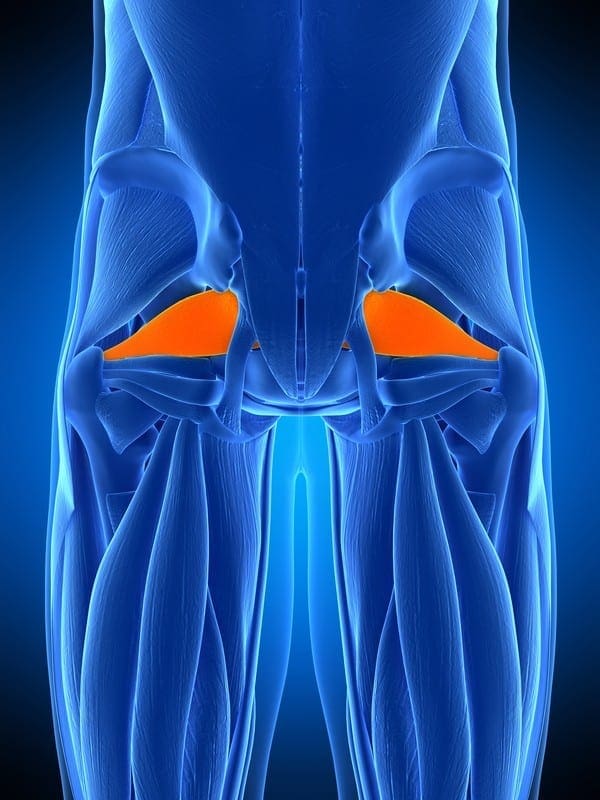Unfortunately, there are no stretches for� Root canals or Kidney stones. But there are stretches for Piriformis syndrome.
These ailments are painful and no fun! Piriformis syndrome�is especially a pain, in the butt, no pun intended.
Seriously, people suffering from Piriformis syndrome have frequent and sometimes severe pain and numbness through the buttocks and down their legs. This occurs when the Piriformis muscle spasms. When this happens, it�can end up also aggravating the sciatic nerve, which compounds the pain with tingling and numbness.
The Piriformis�is a short, small�muscle deep inside our hips, and helps rotate our legs both outward and inward. Because of its proximity to the sciatic nerve, this little body part can cause big problems, and hinder our ability to run, or even walk, through our daily activities with ease.
Fortunately, there are a variety of exercises that help stretch and relax the Piriformis muscle, giving sufferers much-needed relief from the pain and numbness it causes. If you are dealing with Piriformis syndrome, try these stretches to get yourself back on your feet and moving, pain-free.
Contents
Stretches
The “Knee Up” Stretch
Lie on the floor, use a mat or thick rug for comfort, on your back. Stretch both legs out, with your arms to your sides.�Bend one of your legs at the knee and use your hand to pull it toward the opposite shoulder Hold for ten to thirty seconds.�Straighten out that leg, and then do the same motion with the opposite leg and shoulder.
The “Cross Arm” Stretch
Arrange yourself in a sitting position. The bottoms of your feet should be touching each other, with your arms crossed and your hands resting on the opposite leg. Push both knees down toward the floor until you feel the stretch inside your thighs. Hold the position for a count of 30, then relax for a few seconds and repeat up to five more times.
The “Standing” Stretch
This is a handy exercise you can do in the bathroom at work, in a hotel, or anywhere that you would rather not lie on the floor.
Begin in a standing position with both feet flat on the floor, with your feet a shoulder-length apart.��Don’t lock your knees, and keep your back straight.�Lift one knee up and grasp it with both hands. Make sure you keep the knee parallel to the corresponding hip. Use your hands to pull your knee toward the opposite shoulder until you feel a pull along the side of your buttocks. Hold up to one minute, or as long as you can balance. Repeat the action with the other leg. Try to do it three times for each leg.
The “Sit and Bend” Stretch
This is another convenient�exercise that doesn’t require getting on the floor. Choose a solid, straight-backed chair that doesn’t roll,�sit, and bring one leg across the other, resting your ankle on your other leg. Slowly lean forward until you feel a pull along the crossed leg. Hold for up to 30 seconds. Repeat with the other leg, stretching each side 3 times.
Remember that consistency is key. Perform these exercises at least once a day, every day, until your pain and numbness is gone.
These four simple exercises�help you make great strides in recovering from Piriformis syndrome. However, if you perform these for several days and still have pain, or experience pain while attempting the stretches, it is a good idea to make an appointment with a professional chiropractor. He or she will be able to evaluate your condition and offer a comprehensive treatment plan to treat the Piriformis so it doesn’t get worse, or cause additional issues with your sciatic nerve.
Injury Medical Clinic: Chiropractor (Recommended)
General Disclaimer, Licenses and Board Certifications *
Professional Scope of Practice *
The information herein on "Stretches That Alleviate Piriformis Syndrome Pain" is not intended to replace a one-on-one relationship with a qualified health care professional or licensed physician and is not medical advice. We encourage you to make healthcare decisions based on your research and partnership with a qualified healthcare professional.
Blog Information & Scope Discussions
Welcome to El Paso's Premier Wellness and Injury Care Clinic & Wellness Blog, where Dr. Alex Jimenez, DC, FNP-C, a Multi-State board-certified Family Practice Nurse Practitioner (FNP-BC) and Chiropractor (DC), presents insights on how our multidisciplinary team is dedicated to holistic healing and personalized care. Our practice aligns with evidence-based treatment protocols inspired by integrative medicine principles, similar to those on this site and on our family practice-based chiromed.com site, focusing on naturally restoring health for patients of all ages.
Our areas of multidisciplinary practice include Wellness & Nutrition, Chronic Pain, Personal Injury, Auto Accident Care, Work Injuries, Back Injury, Low Back Pain, Neck Pain, Migraine Headaches, Sports Injuries, Severe Sciatica, Scoliosis, Complex Herniated Discs, Fibromyalgia, Complex Injuries, Stress Management, Functional Medicine Treatments, and in-scope care protocols.
Our information scope is multidisciplinary, focusing on musculoskeletal and physical medicine, wellness, contributing etiological viscerosomatic disturbances within clinical presentations, associated somato-visceral reflex clinical dynamics, subluxation complexes, sensitive health issues, and functional medicine articles, topics, and discussions.
We provide and present clinical collaboration with specialists from various disciplines. Each specialist is governed by their professional scope of practice and their jurisdiction of licensure. We use functional health & wellness protocols to treat and support care for musculoskeletal injuries or disorders.
Our videos, posts, topics, and insights address clinical matters and issues that are directly or indirectly related to our clinical scope of practice.
Our office has made a reasonable effort to provide supportive citations and has identified relevant research studies that support our posts. We provide copies of supporting research studies upon request to regulatory boards and the public.
We understand that we cover matters that require an additional explanation of how they may assist in a particular care plan or treatment protocol; therefore, to discuss the subject matter above further, please feel free to ask Dr. Alex Jimenez, DC, APRN, FNP-BC, or contact us at 915-850-0900.
We are here to help you and your family.
Blessings
Dr. Alex Jimenez, DC, MSACP, APRN, FNP-BC*, CCST, IFMCP, CFMP, ATN
email: [email protected]
Multidisciplinary Licensing & Board Certifications:
Licensed as a Doctor of Chiropractic (DC) in Texas & New Mexico*
Texas DC License #: TX5807, Verified: TX5807
New Mexico DC License #: NM-DC2182, Verified: NM-DC2182
Multi-State Advanced Practice Registered Nurse (APRN*) in Texas & Multi-States
Multi-state Compact APRN License by Endorsement (42 States)
Texas APRN License #: 1191402, Verified: 1191402 *
Florida APRN License #: 11043890, Verified: APRN11043890 *
Colorado License #: C-APN.0105610-C-NP, Verified: C-APN.0105610-C-NP
New York License #: N25929, Verified N25929
License Verification Link: Nursys License Verifier
* Prescriptive Authority Authorized
ANCC FNP-BC: Board Certified Nurse Practitioner*
Compact Status: Multi-State License: Authorized to Practice in 40 States*
Graduate with Honors: ICHS: MSN-FNP (Family Nurse Practitioner Program)
Degree Granted. Master's in Family Practice MSN Diploma (Cum Laude)
Dr. Alex Jimenez, DC, APRN, FNP-BC*, CFMP, IFMCP, ATN, CCST
My Digital Business Card
Licenses and Board Certifications:
DC: Doctor of Chiropractic
APRNP: Advanced Practice Registered Nurse
FNP-BC: Family Practice Specialization (Multi-State Board Certified)
RN: Registered Nurse (Multi-State Compact License)
CFMP: Certified Functional Medicine Provider
MSN-FNP: Master of Science in Family Practice Medicine
MSACP: Master of Science in Advanced Clinical Practice
IFMCP: Institute of Functional Medicine
CCST: Certified Chiropractic Spinal Trauma
ATN: Advanced Translational Neutrogenomics
Memberships & Associations:
TCA: Texas Chiropractic Association: Member ID: 104311
AANP: American Association of Nurse Practitioners: Member ID: 2198960
ANA: American Nurse Association: Member ID: 06458222 (District TX01)
TNA: Texas Nurse Association: Member ID: 06458222
NPI: 1205907805
| Primary Taxonomy | Selected Taxonomy | State | License Number |
|---|---|---|---|
| No | 111N00000X - Chiropractor | NM | DC2182 |
| Yes | 111N00000X - Chiropractor | TX | DC5807 |
| Yes | 363LF0000X - Nurse Practitioner - Family | TX | 1191402 |
| Yes | 363LF0000X - Nurse Practitioner - Family | FL | 11043890 |
| Yes | 363LF0000X - Nurse Practitioner - Family | CO | C-APN.0105610-C-NP |
| Yes | 363LF0000X - Nurse Practitioner - Family | NY | N25929 |
Dr. Alex Jimenez, DC, APRN, FNP-BC*, CFMP, IFMCP, ATN, CCST
My Digital Business Card









